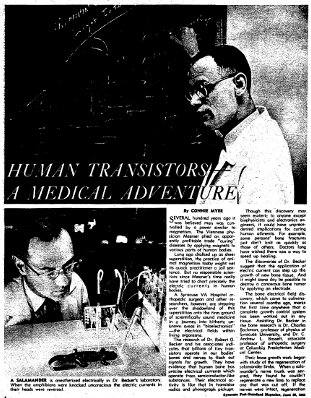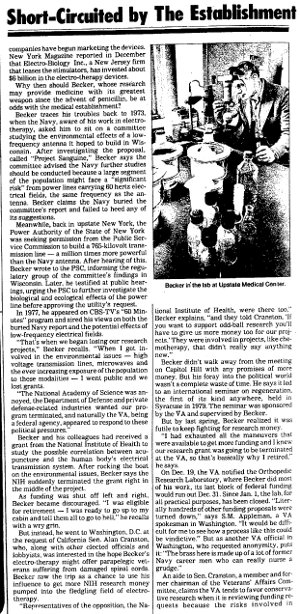See Torture: Asian and Global Perspectives A special thanks to Ed Sacchette for referring me to Torture Magazine which resulted in the publishing of this article. Click here for Mindjustice.org copy. Not for reposting. 
For the first time, the Torture Magazine essay presents an outline of the neuroscience behind mind control, now called neuroweapons. It turns out that the history of neuroscience is revealing significant new evidence that such weapons may already be developed. Just one example of many illustrates the point. Experts agree that understanding, communicating and controlling the brain is a futuristic capability that has some similarities with a radio receiver which can transmit and receive radio waves. To develop neuroweapons with such capabilities requires information age science of semiconductors, solid state physics and bioelectronics, which is the application of electronics science to biology--including the brain. Information age science took off in the 1940s and led to science discoveries such as transistor radios, computers, "human transistors" and much more. Notably, the bioelectronics and "human transistors" research has been extended and has never been disproven. Nevertheless, this promising area of research remains obscure and at a rudimentary level of development. With a look back, two newspaper articles now illustrate some of the reasons why.
First, the New York Post-Standard Sunday Magazine, June 30, 1963 newspaper reported on the start of the promising career of Robert O. Becker, a bioelectronics researcher. Moreover, according to a 1985 BBC documentary and a 2010 book, the U.S. Central Intelligence Agency (CIA) considered Becker's bioelectronics research to be reliable enough to depend on for national security purposes. In the 1960's, the CIA consulted with Becker about the possible use of Soviet bioelectronic weapons on U.S. figher pilots shot down over the former U.S.S.R. Nevertheless, almost 20 years later, the Syracuse Herald-American, February 15, 1981 newspaper reported that Becker's career had been "short-circuited by the establishment."  Becker stated that his research was being derailed by several U.S. government interests because he spoke out publicly about possible health risks of related technologies. Furthermore, in the following 10 years, Becker went public by writing two books that described the U.S. national security establishment and its controlling interest and monopoly over this area of research since at least the 1960s.
Becker stated that his research was being derailed by several U.S. government interests because he spoke out publicly about possible health risks of related technologies. Furthermore, in the following 10 years, Becker went public by writing two books that described the U.S. national security establishment and its controlling interest and monopoly over this area of research since at least the 1960s.
In the 1974 academic journal article cited below, Becker wrote: "In summary, it is proposed that all organisms presently exitant have hybrid data transmission and control systems.  That the basic system consisting of the glia, satellite, SCHWANN continuum is an analog type handling data as a slowly varying d.c. potential generated and transmitted by an integral semiconducting or other solid state property. . . . It is particularly interesting to note that during the period of the maximum growth of computer technology and the development of cybernetics that one of the foremost scientists in this field, John Von Neumann, predicted on logical and mathematical grounds that such a hybridization of data transmission and control functions must exist in the biological world." It is true that promising theories about bioelectricity and the brain, including Becker's, have yet to complete the rigorous scientific process for definitive proof, however significant facts support that U.S. government interests have caused this obscure but critical area of science research to remain undeveloped while at the same time the comparable secret U.S. research could be advanced. Recently there has been a resurgence of interest in research on D.C. currents of the brain, glia as an overlooked brain communication system and analog as well as digital brain communication systems.
That the basic system consisting of the glia, satellite, SCHWANN continuum is an analog type handling data as a slowly varying d.c. potential generated and transmitted by an integral semiconducting or other solid state property. . . . It is particularly interesting to note that during the period of the maximum growth of computer technology and the development of cybernetics that one of the foremost scientists in this field, John Von Neumann, predicted on logical and mathematical grounds that such a hybridization of data transmission and control functions must exist in the biological world." It is true that promising theories about bioelectricity and the brain, including Becker's, have yet to complete the rigorous scientific process for definitive proof, however significant facts support that U.S. government interests have caused this obscure but critical area of science research to remain undeveloped while at the same time the comparable secret U.S. research could be advanced. Recently there has been a resurgence of interest in research on D.C. currents of the brain, glia as an overlooked brain communication system and analog as well as digital brain communication systems.
Click here for Becker's article describing his bioelectronics theory: The Significance of Bioelectric Potentials, Bioelectrochem. Bioenerg. 1:187–199, 1974. Becker's scientific articles can be accessed for free from academic libraries. Click here for Becker's prestigious U.S. government award for this theory. Click here for citations of Becker's scientific research.
Contents | Top